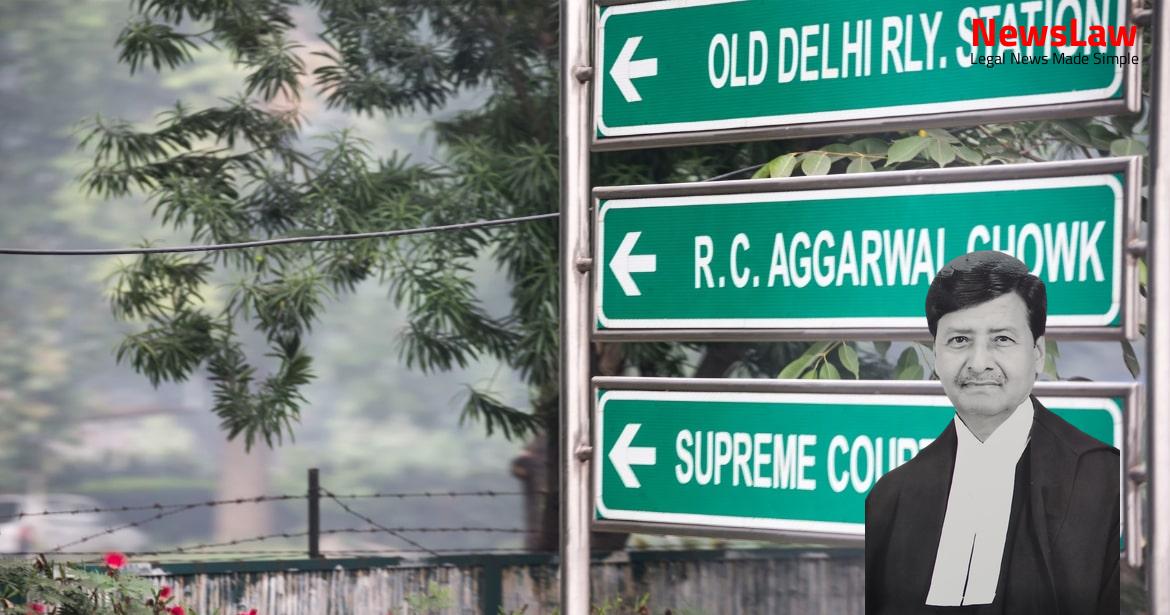Explore the detailed legal analysis provided by the court in a complex property dispute case, emphasizing the significance of admissions and evolving legal relationships. The case underscores the critical role of evidence evaluation and the necessity of a thorough trial to ascertain the parties’ rights in a landlord-tenant relationship scenario. This summary delves into the nuances of property law as demonstrated through the court’s analysis.
Facts
- The Trial Court passed a judgment and decree allowing the application for delivery of possession of the Suit Property in favor of the Respondent based on admissions.
- The High Court dismissed the Regular First Appeal, upholding the Trial Court’s findings on admissions and the decree for possession.
- The Appellant’s lease agreement with the Respondent for the residential property included a monthly rent and security deposit.
- After the lease agreements expired, the tenant did not pay rent, leading to the suit for possession by the Landlord.
- The Appellate Court and High Court both noted the Admissions made by the Appellant, which were not challenged by the Appellant.
- The High Court observed that a suit for specific performance by the Appellant does not impede the Trial Court from deciding the suit for possession based on Landlord-Tenant relationship.
- The Appellant’s review of the Trial Court’s order was also dismissed by the High Court.
- The High Court rejected the Appeal, noting the Trial Court’s findings on admissions and the relationship between Landlord and Tenant.
- Appellant did not mention any amount paid as ‘Bayana’ in lieu of ATS-I dated 22.04.2017.
- No document was presented to show the amount paid as consideration for ATS-I.
- ATS-I was executed without any consideration as per the court’s observation.
- Legal Notice dated 12.04.2018 was served by the Respondent to vacate the Suit Property.
Also Read: Withdrawal of Prospective Resignation: Legal Analysis
Arguments
- The Appellant argued that the defense under Section 53-A of the Transfer of Property Act can only be applicable when consideration has been exchanged, which did not occur in this case.
- The Defendant claimed that by executing three Agreements to Sell for the suit property, the landlord-tenant relationship ceased to exist, and the Defendant became the owner after parting with possession under the Lease Agreement.
- The Appellant contended that they have a valid Agreement to Sell for the property, which was not disputed by the Respondent. This indicates the intention of parties for sale and purchase.
- Appellant relied on previous court cases to argue that the Trial Court should not have passed a decree without a full-fledged trial, as it denies any remedy based on merit.
- The argument was also made that the acceptance of earnest money by the Seller-Landlord under the Agreement to Sell ended the lessor-lessee relationship, terminating the tenancy.
- Appellant referred to legal precedents to support the claim that the Trial Court should not decree the suit under Order XII Rule 6 without a trial, to avoid permanent denial of any remedy on merit.
- It was argued by the Appellant that by accepting earnest money, the Landlord-Seller had acted under the agreement, thereby ending the landlord-tenant relationship.
- The Respondent argued that the Appellant’s possession without paying rent amounted to an abuse of due process of law, considering the Lease Deeds in place.
- Respondent claimed to have a prima facie case for decreeing the suit based on admission under Order XII Rule 6, supported by the termination notice issued and rent receipt.
- The Appellant’s contention regarding a pending Suit for specific performance related to Agreements to Sell was mentioned, indicating that the Trial Court did not consider it in the judgment.
- Appellant contended that no clear admission was made in the Written Statement to warrant a judgment granting possession to the Respondent under Order XII Rule 6.
- The case law was cited to establish that agreements could create and alter jural relationships between parties, with the Appellant’s status potentially changing after signing the Agreement to Sell.
- It was argued that the Appellant’s status shifted to that of a purchaser upon signing the ATS-I, hence extinguishing the landlord-tenant relationship.
- The jural relationship between persons changed through conveyance and subsequent agreement
- Admissions in pleadings or court proceedings hold higher evidentiary value as per Section 58 of the Evidence Act, 1872
- Judgment in Nagindas Ramdas v. Dalptram Iccharam 1974 emphasized on the significance of admissions in pleadings
- Counsel distinguishes the present case from R. Kanthimathi (supra) based on legal grounds
- Reliance placed on the judgement of Himani Alloys Limited for the requirement of clear and categorical admissions for Order XII Rule 6
- Hari Steel case highlighted the discretionary nature of relief under Order XII Rule 6, emphasizing Defendant’s right to contest
- Legal argument supported by Shrimant Shanrao Suryavanshi case indicating rights of a possessor under Section 53 of Transfer of Property Act, 1882
Also Read: Acquittal in Kidnapping and Abduction Case: Court’s Legal Analysis
Analysis
- The court has discretionary power under Order XII Rule 6 to make orders or give judgments based on admission of facts and documents.
- In the case discussed, the court did not find a clear and categorical admission of facts and documents to warrant a judgment on admission.
- The court emphasized that deciding issues like tenancy requires evidence appreciation and cannot be resolved based solely on admissions.
- The judgment highlighted that the execution of the Lease Agreements and monthly tenancy payments were not denied by the Defendant.
- Both the Plaintiff and Defendant presented arguments that should be evaluated during a full-fledged trial for justiciability.
- Rule 2 of Order XII allows parties to give notice to admit documents and the cost of proving non-admitted documents can be borne by the neglectful party.
- Admission of facts such as execution of Lease Agreement and rent payment may not suffice for a judgment under Order XII Rule 6 without considering the Defendant’s defense.
- The judgment stressed the importance of trial for assessing the plausibility of the Defendant’s defense based on ATS agreements.
- Even in absence of a notice, Rule 3A allows courts to record admission on its own motion, ensuring efficient adjudication.
- The court pointed out that the aim of such procedural provisions is to save time and resources by enabling prompt judgments based on admissions.
- The need for evidence and trial was reiterated in the context of evaluating landlord-tenant relationships and property ownership disputes.
- The matter was remanded to the Trial Court for further proceedings, emphasizing the importance of evidence and full-fledged trial in determining the outcome.
- Any party to a suit may give notice, by pleading or writing, admitting the truth of all or part of the other party’s case.
- Either party can request the other to admit documents, and if denied, the refusing party may have to bear the costs of proving the document unless the Court directs otherwise.
- Documents not specifically denied or stated as not admitted shall be deemed admitted unless there is a valid reason for not admitting.
- The Court may require proof of admitted documents under certain circumstances.
- A party neglecting or refusing to admit a document may be directed by the Court to pay costs to the other party as compensation.
- The Court has the power to call upon any party to admit any document even without a formal notice.
- An admission made in response to a notice is only valid for that specific suit and cannot be used against the admitting party in other situations.
- The Court can make orders or judgments based on admissions of fact, without waiting for other issues to be resolved.
- Special provisions in Rules 7, 8, and 9 regarding affidavit of signature, notice to produce documents, and costs are not discussed in detail as they are not relevant to the present case.
- The discretion of the Court to pass judgment on admission was clarified in the case of S.M. Asif v. Virendar Kumar Bajaj – (2015) 9 SCC 287.
- The power under Order XII Rule 6 of CPC is discretionary as indicated by the use of the word ‘may.’
- In the case mentioned, the suit for eviction was filed by the landlord against the tenant, where the tenancy relationship and lease agreement period were admitted.
- The judgment and decree passed under Order XII Rule 6 of CPC must be based on clear and categorical admission.
- The facts of the case are similar to the judgment in S.M. Asif (supra), thus the ratio of that judgment applies.
- The Lease Agreement dated 07.08.2011 and the extended Lease Agreement dated 07.08.2013 are not in dispute.
- By the extended Lease Agreement, the rent was increased by 30% for the year 2013-2014.
- Defendant has not paid rent for over 7 years.
- Trial Court is directed to decide payment of monthly rent based on the increase in rent percentage yearly and order payment of arrears and deposit of regular rent.
- Payment is subject to the outcome of the present suit and the suit for specific performance of the agreement filed by the Appellant.
Also Read: K. vs. The State of Rajasthan)
Supreme Court Judgment Upholds Acquittal in Falsifying Date of Birth Case
Decision
- Judgment and decree passed by the Trial Court and confirmed by the High Court are set aside as the defense was not considered.
- Lease Agreement was for 2 years ending in July 2013.
- The matter is sent back to the Trial Court for expedited decision, allowing both parties to present evidence.
- Tenant has not paid rent starting from July 2014.
- In a Landlord-Tenant suit, rent and arrears must be paid as per Court order.
Case Title: KARAN KAPOOR Vs. MADHURI KUMAR (2022 INSC 661)
Case Number: C.A. No.-004645-004645 / 2022



